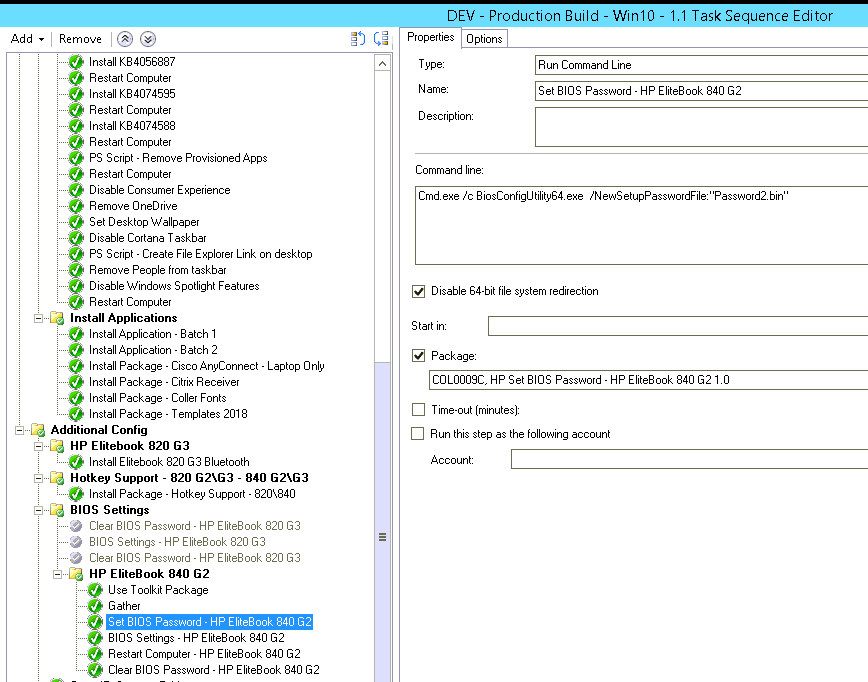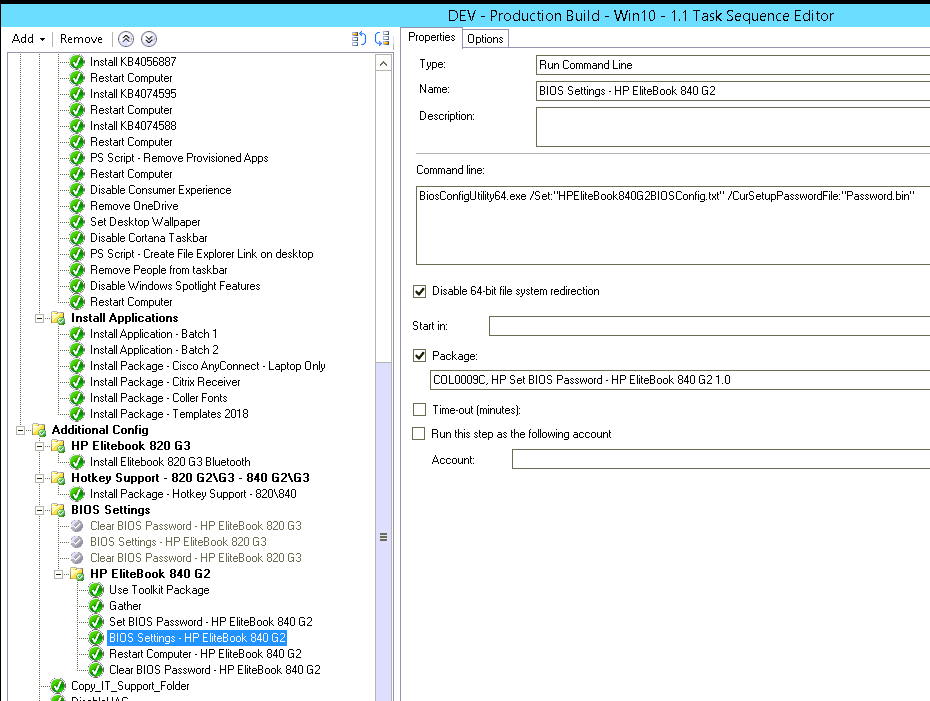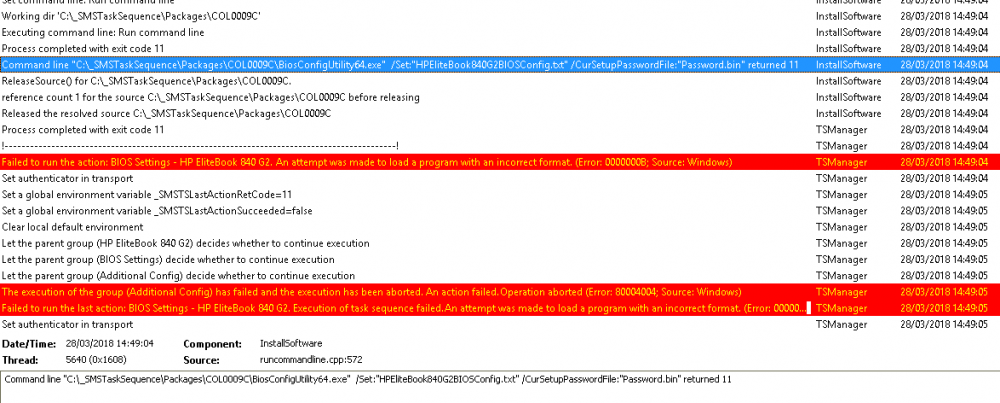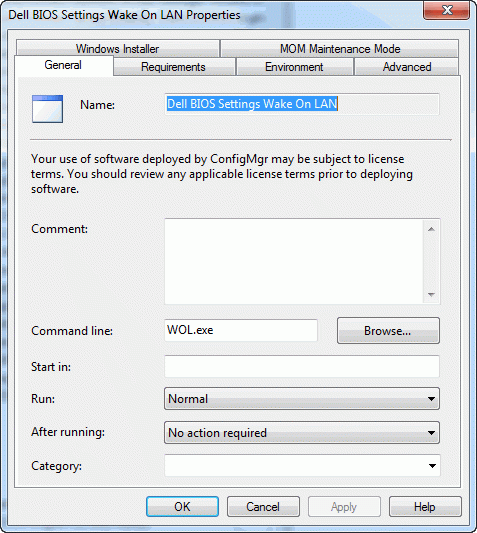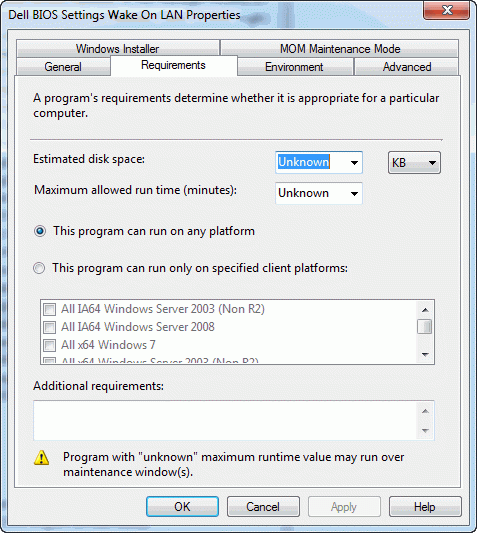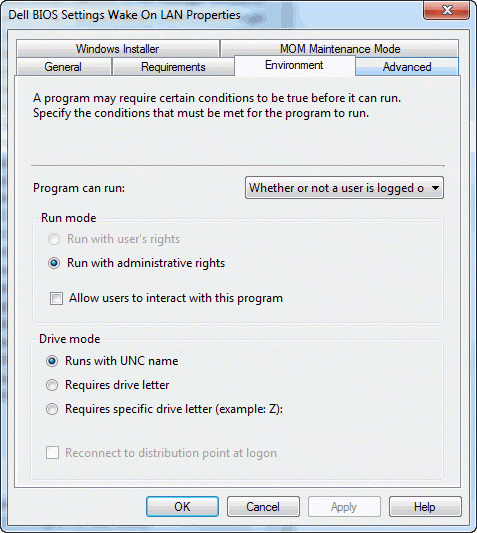Search the Community
Showing results for tags 'bios'.
-
Hi guys, Hoping to find people that have managed to push HP BIOS settings via OSD (Windows 10), I've pretty much followed this guide (only the folder structures are slightly different) but I'm having issues actually deploying the settings, setting the BIOS password seems to work okay and I've read that for certain TPM settings to be pushed then a BIOS password must be set prior. My folder setup: BIOS Config settings to push: BIOSConfig 1.0 ; ; Originally created by BIOS Configuration Utility ; Version: 4.0.24.1 ; Date="2018/03/20" Time="14:53:23" UTC="0" ; ; Found 215 settings ; Virtualization Technology (VTx) Disable *Enable Reset to default TPM Reset to Factory Defaults *No Yes Reset of TPM from OS *Disable Enable OS Management of TPM Disable *Enable Activate TPM On Next Boot Disable *Enable TPM Device Hidden *Available TPM Activation Policy F1 to Boot Allow user to reject *No prompts Hide TPM Device Security Level Change *View Hide OS Management of TPM Security Level Change *View Hide Reset of TPM from OS Security Level Change *View Hide Task sequence setup: The bios password sets just fine, but in the SMSTS log I see the following for BIOS settings - HP EliteBook 840 G2 itself: Have attached the SMSTS.log. Any help would greatly be appreciated, I've been working on this for the last couple of days without success, I've tried: Adding CMD.exe /C prefix (same error) Changing the format of the file to repset (same error) Ran the command manually on the device and works just fine with the same configuration files (as .txt and .repset) Tried running the steps in WinPE rather than in the operating system (same error) Thanks in advance. smsts.log
-
Trying to enable Wake on LAN to a mass amount of already deployed workstations. I pulled down Dell's CCTK. Enabled the Wake on LAN feature for all models and dumped out an EXE from the software. Packaged it in SCCM, and it successfully gets pulled down. However, when SCCM is running the install execmgr.log keeps telling me: Script for Package:CU100103, Program: Dell BIOS Settings Wake On LAN failed with exit code 10 The advertisement status on the console tells me the same information. Has anyone had much experience deploying CCTKs this way? I have included images of the packages program settings; as it might be something in the manor I am telling it to run. Any help is appreciated. Also, Windows Noob is a job saver.
- 9 replies
-
- SCCM
- Wake on LAN
-
(and 1 more)
Tagged with:
-
I am new to Task Sequence. I am working on a task Sequence to convert BIOS (Legacy) mode systems to UEFI mode systems (Dell Laptops)(SCCM with MDT) . Can some share a task sequence to do so or share your experience to do so. Actually my requirement is to add these steps for PXE OSD win 10 1607 task sequence.
-
Hello IT Geeks, I have a task got assigned by my boss to update the BIOS firmware on all the systems in company. which included different types of laptop and desktops models likewise, OptiPlex 7010/9010/9050 and Latitude E6450/7440 etc.. I would like to ask your support/help to do the risk analysis and the best way to doing this? I have pull the report from SCCM and found that we have barely 5000+ objects. It would be really nice if you can explain the workflow to carry this out smoothly? 1) How can i check what is the latest BIOS firmware version available for specific model? 2) Do i need to create application package for user based install or classic package for device based install? 3) How many types of collection do i need to create? 4) We have many offices globally so how this deployments needs to roll out on global location? 5) What are the things i should keep in mind first ? OS Overview/Impact, Updates and patches available, Potential actions, and best approach? Any help would be appreciated? -Roshan
-
Hi all, Not sure if this is the right place to ask but will try anyhow. My college want to do BIOS configuration during OSD (image deployment with MDT) when preparing different Dell PC models to Win10, but I want to use the CCTK tool (from Dell) to do the configuration. My college will make the necessary configuration manually and then do a BIOS backup, and then during OSD deployment make a recovery from the backup for each model. I want to use the tool CCTK in WinPE and then do one configuration at a time with the necessary commands/parameters for "Legacy to UEFI, Enable SecureBoot, Enable virtualization,Enable/active TPM". Which of these two suggestion would be best to prepare the BIOS to Windows 10 installation? Best Regards, Daniel Skaaning
-
I'm trying to set up a task sequence to deploy Windows 10 via PXE to both UEFI and BIOS clients. We have SCCM 2012 SP2 CU4 running on Server 2012 (not R2), with WDS 6.5.9200.16384, ADK 10.1.14393.0, and MDT 6.3.8443.1000. It's s single site and single server. PXE booting to BIOS clients seems to work fine. When PXE booting UEFI client, it loads the boot file and then throws out 0xc0000225 complaining about \Windows\Syetem32\boot\winload.efi . We're deploying the task sequence to the "Unknown Computers" group, and we only care about x64 clients. The task sequence has an x64 boot image, and is the last task sequence deployed. Do I have to do something special to allow both BIOS and UEFI clients to boot successfully at the same time (and using the same task sequence)? I came across this video which sets up policies and defines different files to load based on vendor class, but I haven't tried any of it yet. We're using SCCM and not WDS directly, so I wasn't sure if it was appropriate. Our DHCP server is the same as the SCCM site server, as well. The only DHCP options I have set are 003 (Router), 006 (DNS Servers), 015 (DNS Domain Name), and 060 (PXEClient). Thanks.
-
Hi, I'm having trobule with refreshing Windows 10 computers from WinPE. We need to upgrade BIOS before BIOS Conversion step in CM1610 and set BIOS settings. When reinstalling an computer it fails at staging Boot image. I have tried to size up the disk so it can hold larger WinPE Boot image but it does not work. 2048 MB Recovery 1024 MB EFI 128 MB MSR 100% OSD If I disable the step for BIOS Upgrade and Configure I can reinstall an computer without problems. <![LOG[Process completed with exit code 1]LOG]!><time="14:10:08.323-120" date="05-10-2017" component="TSManager" context="" type="1" thread="1320" file="commandline.cpp:1124"> <![LOG[TSUEFIDrive: ]LOG]!><time="14:10:08.323-120" date="05-10-2017" component="TSManager" context="" type="1" thread="1320" file="bootimage.cpp:774"> <![LOG[Staging boot image CM1000AA]LOG]!><time="14:10:08.323-120" date="05-10-2017" component="TSManager" context="" type="1" thread="1320" file="bootimage.cpp:781"> <![LOG[Mounting \Device\HarddiskVolume6 at Z:]LOG]!><time="14:10:08.338-120" date="05-10-2017" component="TSManager" context="" type="1" thread="1320" file="mountpoint.cpp:49"> <![LOG[Unmounting volume Z:\]LOG]!><time="14:10:08.338-120" date="05-10-2017" component="TSManager" context="" type="1" thread="1320" file="mountpoint.cpp:104"> <![LOG[0, HRESULT=80004005 (e:\nts_sccm_release\sms\framework\tscore\encryptablevolume.cpp,437)]LOG]!><time="14:10:08.354-120" date="05-10-2017" component="TSManager" context="" type="0" thread="1320" file="encryptablevolume.cpp:437"> <![LOG[Checking to see if the data path is on a bootable volume]LOG]!><time="14:10:08.354-120" date="05-10-2017" component="TSManager" context="" type="1" thread="1320" file="bootimage.cpp:1104"> <![LOG[ Volume S:\ is not NTFS]LOG]!><time="14:10:09.249-120" date="05-10-2017" component="TSManager" context="" type="1" thread="1320" file="bootimage.cpp:362"> <![LOG[Searching for a volume to stage the boot image]LOG]!><time="14:10:09.249-120" date="05-10-2017" component="TSManager" context="" type="1" thread="1320" file="bootimage.cpp:1128"> <![LOG[ Volume S:\ is not NTFS]LOG]!><time="14:10:09.264-120" date="05-10-2017" component="TSManager" context="" type="1" thread="1320" file="bootimage.cpp:362"> <![LOG[ Volume X:\ is not on a fixed disk]LOG]!><time="14:10:09.264-120" date="05-10-2017" component="TSManager" context="" type="1" thread="1320" file="bootimage.cpp:342"> <![LOG[BootImage::FindBootableVolume( NULL, sPath), HRESULT=80070490 (e:\nts_sccm_release\sms\framework\tscore\bootimage.cpp,1135)]LOG]!><time="14:10:09.264-120" date="05-10-2017" component="TSManager" context="" type="0" thread="1320" file="bootimage.cpp:1135"> <![LOG[Unable to find a volume that is suitable for staging the boot image. Element not found. (Error: 80070490; Source: Windows)]LOG]!><time="14:10:09.264-120" date="05-10-2017" component="TSManager" context="" type="3" thread="1320" file="bootimage.cpp:1135"> <![LOG[BootImage::PrepareForStaging(sLocalDataPath), HRESULT=80070490 (e:\nts_sccm_release\sms\framework\tscore\bootimage.cpp,783)]LOG]!><time="14:10:09.264-120" date="05-10-2017" component="TSManager" context="" type="0" thread="1320" file="bootimage.cpp:783"> <![LOG[Failed to validate for boot image staging]LOG]!><time="14:10:09.264-120" date="05-10-2017" component="TSManager" context="" type="3" thread="1320" file="bootimage.cpp:783"> <![LOG[StageBootImage() failed. 0x80070490.]LOG]!><time="14:10:09.264-120" date="05-10-2017" component="TSManager" context="" type="3" thread="1320" file="bootimage.cpp:889"> <![LOG[TS::Boot::BootImage::StageBootImage(sBootImageID, StageBootImageProgressCallback, (LPVOID) m_sStageBootImageMessage.c_str()), HRESULT=80070490 (e:\nts_sccm_release\sms\client\tasksequence\executionengine\engine.cxx,972)]LOG]!><time="14:10:09.264-120" date="05-10-2017" component="TSManager" context="" type="0" thread="1320" file="engine.cxx:972"> <![LOG[Failed to stage a boot image CM1000AA. Element not found. (Error: 80070490; Source: Windows)]LOG]!><time="14:10:09.264-120" date="05-10-2017" component="TSManager" context="" type="3" thread="1320" file="engine.cxx:972"> <![LOG[Failed to reboot the system. Error 0x80070490)]LOG]!><time="14:10:09.264-120" date="05-10-2017" component="TSManager" context="" type="3" thread="1320" file="engine.cxx:1140"> <![LOG[RebootSystem(pwszRebootMessage, dwRebootTimeout, dwRebootReason, bRebootWinPE), HRESULT=80070490 (e:\nts_sccm_release\sms\client\tasksequence\executionengine\engine.cxx,622)]LOG]!><time="14:10:09.264-120" date="05-10-2017" component="TSManager" context="" type="0" thread="1320" file="engine.cxx:622"> <![LOG[Failed to initialize a system reboot. Element not found. (Error: 80070490; Source: Windows)]LOG]!><time="14:10:09.264-120" date="05-10-2017" component="TSManager" context="" type="3" thread="1320" file="engine.cxx:622"> <![LOG[CheckForRebootRequest(&bRebootInitiated), HRESULT=80070490 (e:\nts_sccm_release\sms\client\tasksequence\executionengine\engine.cxx,310)]LOG]!><time="14:10:09.264-120" date="05-10-2017" component="TSManager" context="" type="0" thread="1320" file="engine.cxx:310"> <![LOG[Fatal error is returned in check for reboot request of the action (Restart Computer). Element not found. (Error: 80070490; Source: Windows)]LOG]!><time="14:10:09.264-120" date="05-10-2017" component="TSManager" context="" type="3" thread="1320" file="engine.cxx:310"> <![LOG[An error (0x80070490) is encountered in execution of the task sequence]LOG]!><time="14:10:09.264-120" date="05-10-2017" component="TSManager" context="" type="3" thread="1320" file="engine.cxx:390"> <![LOG[MP server http://LKSRVSCCM03.res.ludvika.intra. Ports 80,443. CRL=false.]LOG]!><time="14:10:09.264-120" date="05-10-2017" component="TSManager" context="" type="1" thread="1320" file="utils.cpp:6255"> <![LOG[Setting authenticator]LOG]!><time="14:10:09.280-120" date="05-10-2017" component="TSManager" context="" type="1" thread="1320" file="utils.cpp:6277"> <![LOG[Set authenticator in transport]LOG]!><time="14:10:09.280-120" date="05-10-2017" component="TSManager" context="" type="0" thread="1320" file="libsmsmessaging.cpp:7958"> <![LOG[Sending StatusMessage]LOG]!><time="14:10:09.296-120" date="05-10-2017" component="TSManager" context="" type="1" thread="1320" file="libsmsmessaging.cpp:4114"> <![LOG[Setting message signatures.]LOG]!><time="14:10:09.296-120" date="05-10-2017" component="TSManager" context="" type="0" thread="1320" file="libsmsmessaging.cpp:1383"> <![LOG[Setting the authenticator.]LOG]!><time="14:10:09.296-120" date="05-10-2017" component="TSManager" context="" type="0" thread="1320" file="libsmsmessaging.cpp:1413"> <![LOG[CLibSMSMessageWinHttpTransport::Send: URL: LKSRVSCCM03.res.ludvika.intra:80 CCM_POST /ccm_system/request]LOG]!><time="14:10:09.296-120" date="05-10-2017" component="TSManager" context="" type="1" thread="1320" file="libsmsmessaging.cpp:8828"> <![LOG[Request was successful.]LOG]!><time="14:10:09.327-120" date="05-10-2017" component="TSManager" context="" type="0" thread="1320" file="libsmsmessaging.cpp:9163"> <![LOG[Executing command line: X:\WINDOWS\system32\cmd.exe /k]LOG]!><time="14:10:21.451-120" date="05-10-2017" component="TSBootShell" context="" type="1" thread="1016" file="bootshell.cpp:1011"> <![LOG[The command completed successfully.]LOG]!><time="14:10:21.455-120" date="05-10-2017" component="TSBootShell" context="" type="1" thread="1016" file="bootshell.cpp:1093"> <![LOG[Successfully launched command shell.]LOG]!><time="14:10:21.455-120" date="05-10-2017" component="TSBootShell" context="" type="1" thread="1016" file="bootshell.cpp:444"> <![LOG[m_TSEngine.Execute(& m_eExecutionResult), HRESULT=80070490 (e:\nts_sccm_release\sms\client\tasksequence\tsmanager\tsmanager.cpp,1250)]LOG]!><time="14:25:10.554-120" date="05-10-2017" component="TSManager" context="" type="0" thread="1320" file="tsmanager.cpp:1250"> Thanks in advance, EGGLAS
-
Hi, I'm having trobule with refreshing Windows 10 computers from WinPE. We need to upgrade BIOS before BIOS Conversion step in CM1610 and set BIOS settings. When reinstalling an computer it fails at staging Boot image. I have tried to size up the disk so it can hold larger WinPE Boot image but it does not work. 2048 MB Recovery 1024 MB EFI 128 MB MSR 100% OSD If I disable the step for BIOS Upgrade and Configure I can reinstall an computer without problems. <![LOG[Process completed with exit code 1]LOG]!><time="14:10:08.323-120" date="05-10-2017" component="TSManager" context="" type="1" thread="1320" file="commandline.cpp:1124"> <![LOG[TSUEFIDrive: ]LOG]!><time="14:10:08.323-120" date="05-10-2017" component="TSManager" context="" type="1" thread="1320" file="bootimage.cpp:774"> <![LOG[Staging boot image CM1000AA]LOG]!><time="14:10:08.323-120" date="05-10-2017" component="TSManager" context="" type="1" thread="1320" file="bootimage.cpp:781"> <![LOG[Mounting \Device\HarddiskVolume6 at Z:]LOG]!><time="14:10:08.338-120" date="05-10-2017" component="TSManager" context="" type="1" thread="1320" file="mountpoint.cpp:49"> <![LOG[Unmounting volume Z:\]LOG]!><time="14:10:08.338-120" date="05-10-2017" component="TSManager" context="" type="1" thread="1320" file="mountpoint.cpp:104"> <![LOG[0, HRESULT=80004005 (e:\nts_sccm_release\sms\framework\tscore\encryptablevolume.cpp,437)]LOG]!><time="14:10:08.354-120" date="05-10-2017" component="TSManager" context="" type="0" thread="1320" file="encryptablevolume.cpp:437"> <![LOG[Checking to see if the data path is on a bootable volume]LOG]!><time="14:10:08.354-120" date="05-10-2017" component="TSManager" context="" type="1" thread="1320" file="bootimage.cpp:1104"> <![LOG[ Volume S:\ is not NTFS]LOG]!><time="14:10:09.249-120" date="05-10-2017" component="TSManager" context="" type="1" thread="1320" file="bootimage.cpp:362"> <![LOG[Searching for a volume to stage the boot image]LOG]!><time="14:10:09.249-120" date="05-10-2017" component="TSManager" context="" type="1" thread="1320" file="bootimage.cpp:1128"> <![LOG[ Volume S:\ is not NTFS]LOG]!><time="14:10:09.264-120" date="05-10-2017" component="TSManager" context="" type="1" thread="1320" file="bootimage.cpp:362"> <![LOG[ Volume X:\ is not on a fixed disk]LOG]!><time="14:10:09.264-120" date="05-10-2017" component="TSManager" context="" type="1" thread="1320" file="bootimage.cpp:342"> <![LOG[BootImage::FindBootableVolume( NULL, sPath), HRESULT=80070490 (e:\nts_sccm_release\sms\framework\tscore\bootimage.cpp,1135)]LOG]!><time="14:10:09.264-120" date="05-10-2017" component="TSManager" context="" type="0" thread="1320" file="bootimage.cpp:1135"> <![LOG[Unable to find a volume that is suitable for staging the boot image. Element not found. (Error: 80070490; Source: Windows)]LOG]!><time="14:10:09.264-120" date="05-10-2017" component="TSManager" context="" type="3" thread="1320" file="bootimage.cpp:1135"> <![LOG[BootImage::PrepareForStaging(sLocalDataPath), HRESULT=80070490 (e:\nts_sccm_release\sms\framework\tscore\bootimage.cpp,783)]LOG]!><time="14:10:09.264-120" date="05-10-2017" component="TSManager" context="" type="0" thread="1320" file="bootimage.cpp:783"> <![LOG[Failed to validate for boot image staging]LOG]!><time="14:10:09.264-120" date="05-10-2017" component="TSManager" context="" type="3" thread="1320" file="bootimage.cpp:783"> <![LOG[StageBootImage() failed. 0x80070490.]LOG]!><time="14:10:09.264-120" date="05-10-2017" component="TSManager" context="" type="3" thread="1320" file="bootimage.cpp:889"> <![LOG[TS::Boot::BootImage::StageBootImage(sBootImageID, StageBootImageProgressCallback, (LPVOID) m_sStageBootImageMessage.c_str()), HRESULT=80070490 (e:\nts_sccm_release\sms\client\tasksequence\executionengine\engine.cxx,972)]LOG]!><time="14:10:09.264-120" date="05-10-2017" component="TSManager" context="" type="0" thread="1320" file="engine.cxx:972"> <![LOG[Failed to stage a boot image CM1000AA. Element not found. (Error: 80070490; Source: Windows)]LOG]!><time="14:10:09.264-120" date="05-10-2017" component="TSManager" context="" type="3" thread="1320" file="engine.cxx:972"> <![LOG[Failed to reboot the system. Error 0x80070490)]LOG]!><time="14:10:09.264-120" date="05-10-2017" component="TSManager" context="" type="3" thread="1320" file="engine.cxx:1140"> <![LOG[RebootSystem(pwszRebootMessage, dwRebootTimeout, dwRebootReason, bRebootWinPE), HRESULT=80070490 (e:\nts_sccm_release\sms\client\tasksequence\executionengine\engine.cxx,622)]LOG]!><time="14:10:09.264-120" date="05-10-2017" component="TSManager" context="" type="0" thread="1320" file="engine.cxx:622"> <![LOG[Failed to initialize a system reboot. Element not found. (Error: 80070490; Source: Windows)]LOG]!><time="14:10:09.264-120" date="05-10-2017" component="TSManager" context="" type="3" thread="1320" file="engine.cxx:622"> <![LOG[CheckForRebootRequest(&bRebootInitiated), HRESULT=80070490 (e:\nts_sccm_release\sms\client\tasksequence\executionengine\engine.cxx,310)]LOG]!><time="14:10:09.264-120" date="05-10-2017" component="TSManager" context="" type="0" thread="1320" file="engine.cxx:310"> <![LOG[Fatal error is returned in check for reboot request of the action (Restart Computer). Element not found. (Error: 80070490; Source: Windows)]LOG]!><time="14:10:09.264-120" date="05-10-2017" component="TSManager" context="" type="3" thread="1320" file="engine.cxx:310"> <![LOG[An error (0x80070490) is encountered in execution of the task sequence]LOG]!><time="14:10:09.264-120" date="05-10-2017" component="TSManager" context="" type="3" thread="1320" file="engine.cxx:390"> <![LOG[MP server http://LKSRVSCCM03.res.ludvika.intra. Ports 80,443. CRL=false.]LOG]!><time="14:10:09.264-120" date="05-10-2017" component="TSManager" context="" type="1" thread="1320" file="utils.cpp:6255"> <![LOG[Setting authenticator]LOG]!><time="14:10:09.280-120" date="05-10-2017" component="TSManager" context="" type="1" thread="1320" file="utils.cpp:6277"> <![LOG[Set authenticator in transport]LOG]!><time="14:10:09.280-120" date="05-10-2017" component="TSManager" context="" type="0" thread="1320" file="libsmsmessaging.cpp:7958"> <![LOG[Sending StatusMessage]LOG]!><time="14:10:09.296-120" date="05-10-2017" component="TSManager" context="" type="1" thread="1320" file="libsmsmessaging.cpp:4114"> <![LOG[Setting message signatures.]LOG]!><time="14:10:09.296-120" date="05-10-2017" component="TSManager" context="" type="0" thread="1320" file="libsmsmessaging.cpp:1383"> <![LOG[Setting the authenticator.]LOG]!><time="14:10:09.296-120" date="05-10-2017" component="TSManager" context="" type="0" thread="1320" file="libsmsmessaging.cpp:1413"> <![LOG[CLibSMSMessageWinHttpTransport::Send: URL: LKSRVSCCM03.res.ludvika.intra:80 CCM_POST /ccm_system/request]LOG]!><time="14:10:09.296-120" date="05-10-2017" component="TSManager" context="" type="1" thread="1320" file="libsmsmessaging.cpp:8828"> <![LOG[Request was successful.]LOG]!><time="14:10:09.327-120" date="05-10-2017" component="TSManager" context="" type="0" thread="1320" file="libsmsmessaging.cpp:9163"> <![LOG[Executing command line: X:\WINDOWS\system32\cmd.exe /k]LOG]!><time="14:10:21.451-120" date="05-10-2017" component="TSBootShell" context="" type="1" thread="1016" file="bootshell.cpp:1011"> <![LOG[The command completed successfully.]LOG]!><time="14:10:21.455-120" date="05-10-2017" component="TSBootShell" context="" type="1" thread="1016" file="bootshell.cpp:1093"> <![LOG[Successfully launched command shell.]LOG]!><time="14:10:21.455-120" date="05-10-2017" component="TSBootShell" context="" type="1" thread="1016" file="bootshell.cpp:444"> <![LOG[m_TSEngine.Execute(& m_eExecutionResult), HRESULT=80070490 (e:\nts_sccm_release\sms\client\tasksequence\tsmanager\tsmanager.cpp,1250)]LOG]!><time="14:25:10.554-120" date="05-10-2017" component="TSManager" context="" type="0" thread="1320" file="tsmanager.cpp:1250"> Thanks in advance, EGGLAS
-
OSD task sequence for adaptive BIOS/UEFI support
frhell posted a topic in Configuration Manager 2012
Hi to all... With SCCM 2012R2 in OSD enviroment it's possibile to create a unique task sequence with adaptive support for BIOS and UEFI machine? Thanks in advance. -
Hi We are planning a Windows 10 deployment for the not to distant future and I am working on getting a new set of task sequences setup for this, incorporating some of the niggly things we've wanted to do for a long time but haven't had the time or patience. One of those things is setting up the computers BIOS settings to our corporate setup. We are primarily all Dell computers, or varying ages, but the majority will run Dell CCTK commands, which is how we do the settings at the moment post task sequence. I basically followed this article to setup the CCTK part of our task sequence (https://miketerrill.net/2015/08/31/automating-dell-bios-uefi-standards-for-windows-10/). Under a Win PE 10 x86 boot image - I have a CCTK exe which changes the system to remove our standard password and use password. So when the rest of the commands are run (which require the password in the command line) the real password doesn't show in the log files. Another CCTK exe resets the password later. I have now found I need a x64 boot image, so I have done the normal import etc. etc. but the Dell CCTK exe which ran perfectly well under x86 now fails... When I try to run it using the F8 command prompt I get a message saying "Subsystem needed to support the image type is not present" - the exe was made on an x64 machine and should be multi platform. Has anyone else tried this and come up with a similar problem or a solution? Thanks everyone John
- 3 replies
-
- SCCM
- Configuration Manager
-
(and 2 more)
Tagged with:
-
Does anyone know if there is a way to skip the Set BIOS password step in an OSD if there is already a password set. I want the task sequence to add the BIOS password if non-existent and skip it if it is. Thanks, Mike
-
Can anyone give me a few tips on how to achieve this? I have an .exe file that I downloaded from DELL; I can use the -NOPAUSE parameter to pass to this file, to force a shutdown and to disable notifications. I created a package and I deployed it to a collection (as required) that queries all my devices with a BIOS less than 'x'. The collection query process works fine as it shows the only DELL machine that has a BIOS version less than 'x'; however, the package is sent to the computer, but it doesn't actually run. Any ideas on how to get this to work? Thanks!





